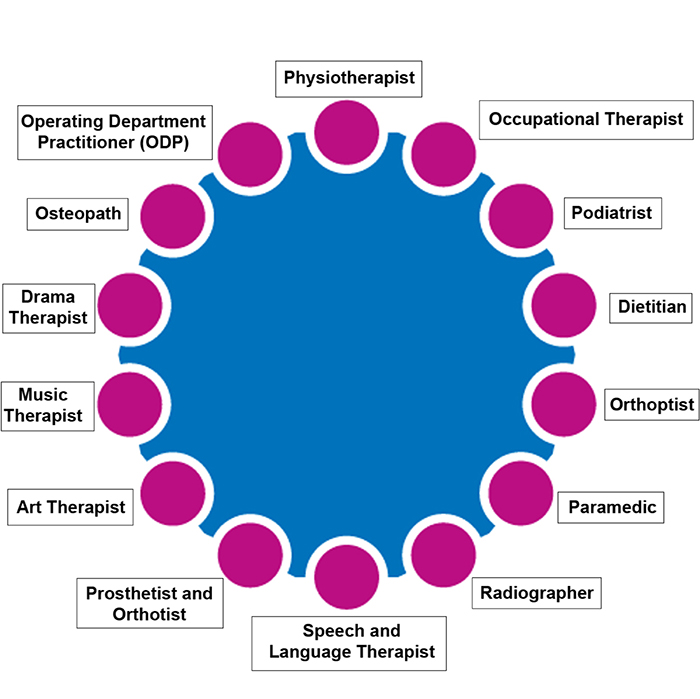What is a AHP (allied health professional)?
AHPs are the third largest workforce in the NHS – working alongside doctors and nurses in most areas of the NHS.
They work in a range of surroundings including hospitals, people’s homes, clinics, GP surgeries and schools – with both health and social care colleagues.
Most are regulated by the Health and Care Professions Council (HCPC).
These are the main types of AHP that work within the NHS.
Art therapist
Practice a form of psychotherapy that uses art media as its main mode of expression and communication
Audiologist
Identify, assess and manage disorders of hearing, balance and other neural systems.
Drama therapist
Use role play, voice work, movement and storytelling to help people explore and solve personal and social problems
Chiropodist/podiatrist
Assess, diagnosis and treat (medical and surgical) disorders of the feet and lower leg
Dietitian
Assess, diagnose and treat dietary and nutritional problems
Music therapist
Use music and sound to help improve people’s emotional well-being, relieve stress and build confidence
Occupational therapist
Helps people of all ages overcome challenges completing everyday tasks or activities. They are very important in getting patients home from hospital
Operating department practitioner (ODP)
Provide skilled care and support to patients at all stages of an operation: anaesthetic, operation and recovery. Assist the anaesthetist, surgeon and scrub nurses in an operating theatre

Orthoptist
Specialise in disorders of eye movements and diagnostic procedures related to disorders of the eye
Osteopath
Detecting, treat and prevent health problems by moving, stretching and massaging a person’s muscles and joints
Paramedic
Respond to emergencies, usually via an ambulance or other emergency vehicle, and provide any necessary medical care on the scene. They also work in GP and other settings
Pharmacist
Specialise in the preparation, dispensing, and management of medications. They are also trained in managing minor illnesses and providing health and wellbeing advice.
Physiotherapist
Help people recover their range of movement following an injury or illness. They also help disabled people improve their health and quality of life through exercise and manual therapy
Prosthetist/orthotist
Make and fit artificial limbs (prostheses) for people with disabilities
Radiographer (two types)
Diagnostic: responsible for taking x-rays of patients
Therapeutic: use a range of highly-specialised equipment to deliver radiation to tumours to destroy diseased tissue
Speech and language therapist (SALT)
Provide specialist assessment, advice and support for people who have speech and language problems
Summary
We have described what is a AHP (allied health professional). We hope it has been helpful.

